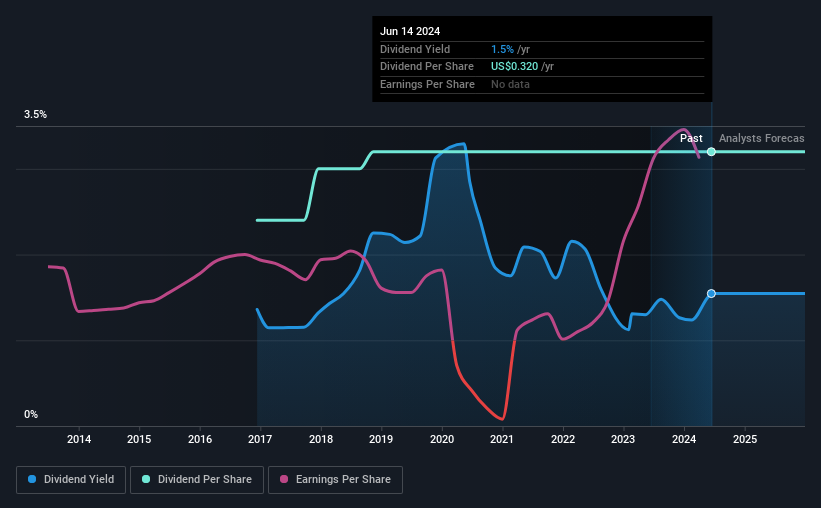
Wabash National Corporation (NYSE:WNC) will pay a dividend of $0.08 on the 25th of July. Based on this payment, the dividend yield will be 1.5%, which is fairly typical for the industry.
Check out our latest analysis for Wabash National
Wabash National's Payment Has Solid Earnings Coverage
Solid dividend yields are great, but they only really help us if the payment is sustainable. However, prior to this announcement, Wabash National's dividend was comfortably covered by both cash flow and earnings. As a result, a large proportion of what it earned was being reinvested back into the business.
EPS is set to fall by 24.5% over the next 12 months. Assuming the dividend continues along recent trends, we believe the payout ratio could be 10%, which we are pretty comfortable with and we think is feasible on an earnings basis.

Wabash National Is Still Building Its Track Record
The dividend's track record has been pretty solid, but with only 8 years of history we want to see a few more years of history before making any solid conclusions. The dividend has gone from an annual total of $0.24 in 2016 to the most recent total annual payment of $0.32. This implies that the company grew its distributions at a yearly rate of about 3.7% over that duration. Wabash National hasn't been paying a dividend for very long, so we wouldn't get to excited about its record of growth just yet.
The Dividend Looks Likely To Grow
Investors who have held shares in the company for the past few years will be happy with the dividend income they have received. We are encouraged to see that Wabash National has grown earnings per share at 32% per year over the past five years. Earnings have been growing rapidly, and with a low payout ratio we think that the company could turn out to be a great dividend stock.
Wabash National Looks Like A Great Dividend Stock
Overall, we like to see the dividend staying consistent, and we think Wabash National might even raise payments in the future. The company is generating plenty of cash, and the earnings also quite easily cover the distributions. If earnings do fall over the next 12 months, the dividend could be buffeted a little bit, but we don't think it should cause too much of a problem in the long term. All of these factors considered, we think this has solid potential as a dividend stock.
It's important to note that companies having a consistent dividend policy will generate greater investor confidence than those having an erratic one. However, there are other things to consider for investors when analysing stock performance. To that end, Wabash National has 3 warning signs (and 1 which is a bit concerning) we think you should know about. Looking for more high-yielding dividend ideas? Try our collection of strong dividend payers.
Valuation is complex, but we're here to simplify it.
Discover if Wabash National might be undervalued or overvalued with our detailed analysis, featuring fair value estimates, potential risks, dividends, insider trades, and its financial condition.
Access Free AnalysisHave feedback on this article? Concerned about the content? Get in touch with us directly. Alternatively, email editorial-team (at) simplywallst.com.
This article by Simply Wall St is general in nature. We provide commentary based on historical data and analyst forecasts only using an unbiased methodology and our articles are not intended to be financial advice. It does not constitute a recommendation to buy or sell any stock, and does not take account of your objectives, or your financial situation. We aim to bring you long-term focused analysis driven by fundamental data. Note that our analysis may not factor in the latest price-sensitive company announcements or qualitative material. Simply Wall St has no position in any stocks mentioned.
Have feedback on this article? Concerned about the content? Get in touch with us directly. Alternatively, email editorial-team@simplywallst.com
About NYSE:WNC
Wabash National
Manufactures engineered solutions and services for transportation, logistics and infrastructure industry in the United States.
Fair value with moderate growth potential.

